Key takeaways:
- Ethical eating connects food choices to broader societal impacts, encouraging support for local farms and sustainable practices.
- Feminist fashion promotes inclusivity, sustainable practices, and challenges gender norms, reinforcing the importance of conscious consumerism.
- Choosing ethical clothing aligns personal values with sustainable and fair labor practices in the fashion industry.
- Planning meals and participating in community-supported agriculture enhance the connection to food sources while promoting healthier choices.
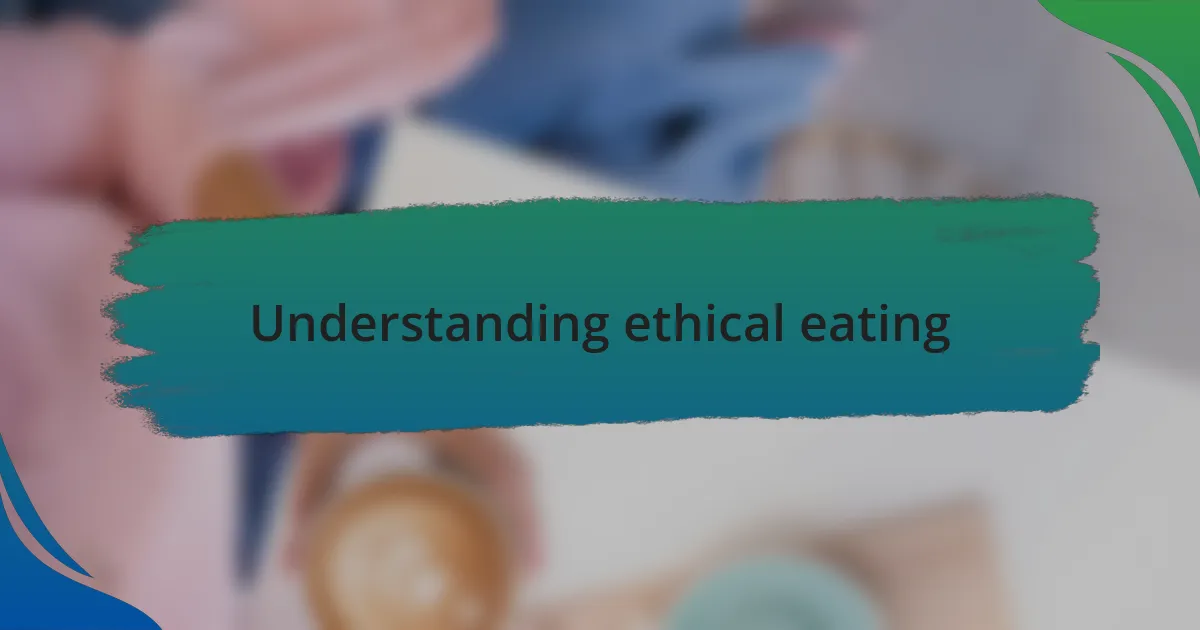
Understanding ethical eating
Ethical eating is about making choices that align with our values, particularly regarding how food production impacts the environment, animals, and communities. I remember the first time I sat down with a friend who was passionate about sustainable agriculture. She shared stories of local farmers fighting against big corporations, which opened my eyes to how our food choices can either support or undermine these efforts.
When we talk about ethical eating, we often confront some tough questions: Are we willing to sacrifice convenience for the sake of sustainability? I recall grappling with this tension during a busy week when I found myself reaching for a pre-packaged meal. The moment I realized what I was choosing over supporting local farms hit home; it made my heart heavy but also fueled my commitment to make more mindful decisions.
There’s a profound connection between what we eat and the broader implications for society. I once attended a workshop on ethical eating where we tasted various plant-based dishes. It was not just delicious; it was a celebration of choices that fostered inclusivity and community support. This experience reminded me that ethical eating is not just a personal journey; it’s a collective movement towards a more humane and just food system.
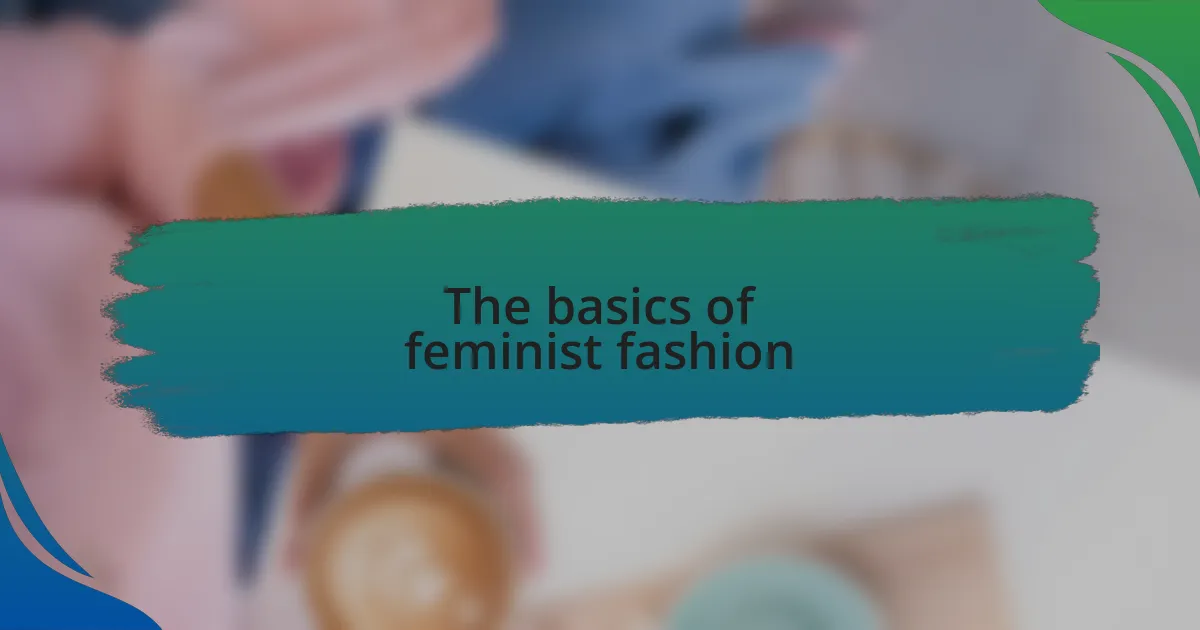
The basics of feminist fashion
Feminist fashion is about more than just aesthetic; it signifies a commitment to inclusivity and representation. I once attended a fashion show that exclusively featured designers who prioritized sizes often overlooked in mainstream media. Witnessing this diversity opened my eyes to how fashion can empower individuals and challenge societal standards, prompting the question: how often do we truly consider the inclusivity of the brands we support?
The movement also emphasizes sustainable practices, urging us to think critically about who makes our clothes. I remember browsing a local boutique and discovering that the garments were made by artisans in fair-trade cooperatives. It made me realize that when we choose to support ethical brands, we’re not just buying clothes; we’re investing in craft, dignity, and a positive impact on communities.
At its core, feminist fashion challenges traditional gender norms and celebrates personal expression. I think back to a conversation I had with a friend who proudly wore outfits that blended masculine and feminine styles. Her confidence was contagious, reinforcing the idea that fashion can be a powerful tool for self-identity and rebellion against societal constraints. Isn’t it inspiring to think that an outfit could spark such profound conversations?
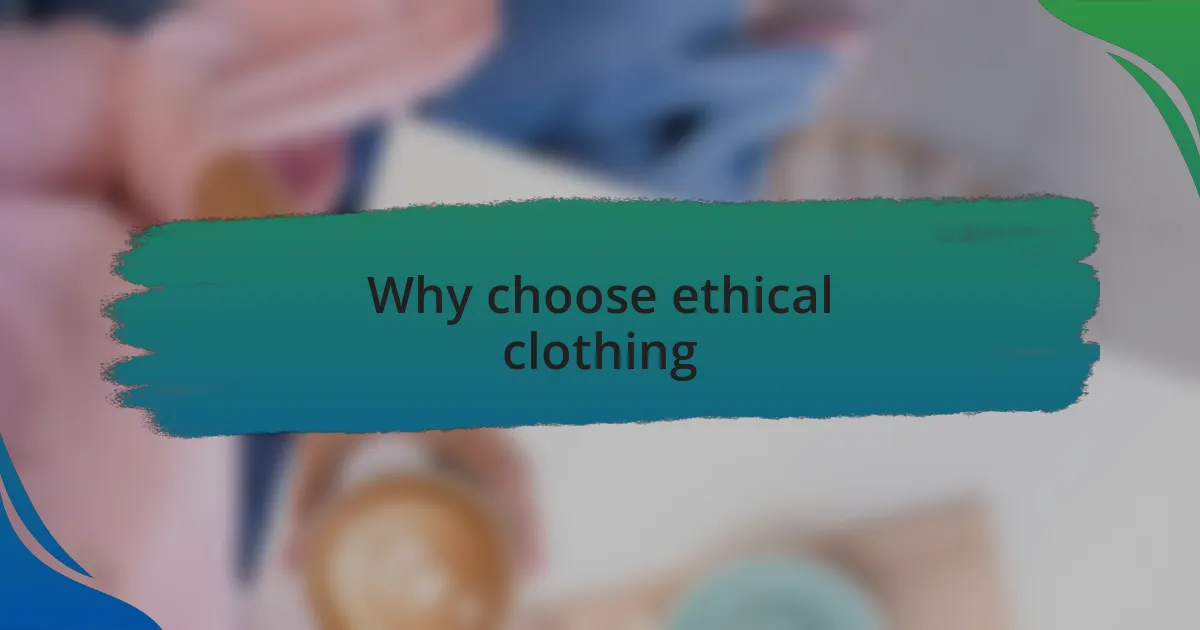
Why choose ethical clothing
Choosing ethical clothing is about aligning our wardrobe choices with our values. I still recall a time when I found a vintage dress at a thrift store; not only was it beautiful, but it was also a sustainable choice that contributed to reducing waste. Isn’t it remarkable how a single piece can embody both style and responsibility?
Ethical clothing often represents better working conditions and fair wages for those who make our garments. I once met a clothing designer at a local market who shared stories about how her cooperative empowered women in her community. Listening to her passion underscored my belief that each purchase is a vote for the kind of world we want to create.
Beyond the personal and ethical implications, ethical clothing often encourages creativity and individuality. I remember experimenting with upcycled pieces and feeling proud to wear something unique that had a backstory. This made me wonder—when we embrace ethical fashion, could we be redefining our personal identities while contributing to a larger narrative of change?
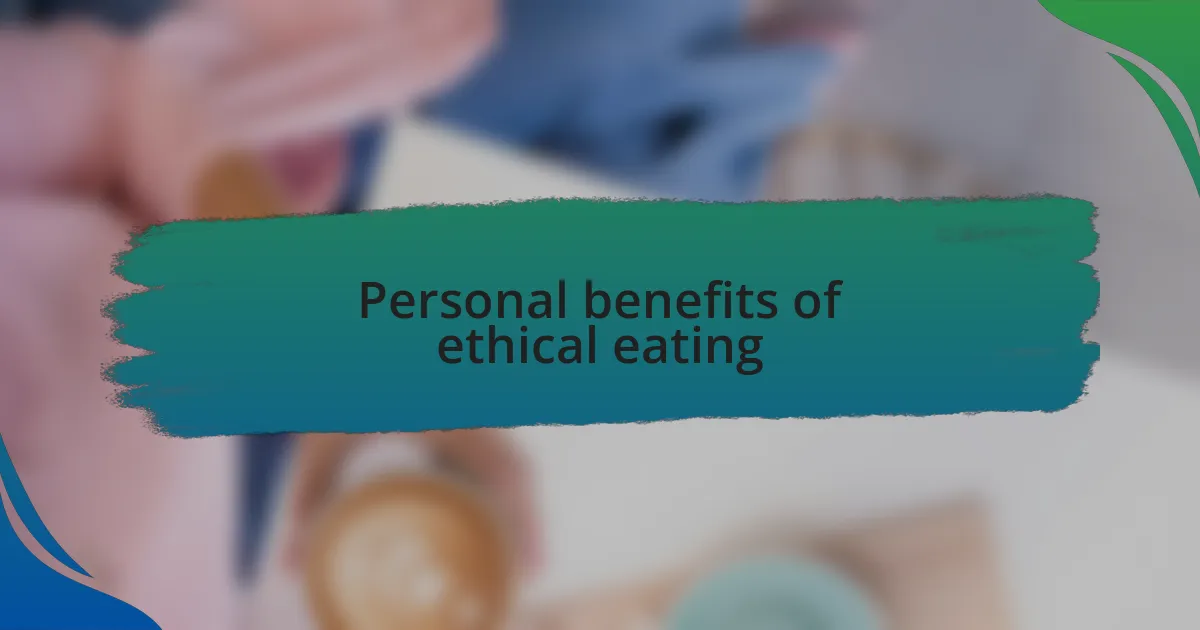
Personal benefits of ethical eating
Making the choice to eat ethically has brought a sense of peace and fulfillment to my daily life. I remember the first time I switched to locally-sourced produce; it felt as if I was connecting with my community in a whole new way. Now, each meal isn’t just about sustenance—it’s a celebration of the land and the farmers who nurture it.
One of the most noticeable benefits of ethical eating is its impact on my health. Switching to organic and plant-based options has not only enhanced my mood, but it’s also helped me feel more energized and vibrant. I often reflect on how the food I consume directly influences my well-being, making me appreciate the choices I make. Doesn’t it feel empowering to know that what you eat can contribute to your own health as much as it does to the planet?
I’ve also discovered a deeper sense of connection with the food itself. Preparing meals using ethically sourced ingredients has transformed cooking from a chore into a creative outlet for me. Each time I chop fresh vegetables or mix spices, I feel gratitude for the hands that grew them. This emotional fulfillment is a constant reminder that the act of eating can be both nourishing and uplifting, making every meal an opportunity to showcase my values in a delicious way.
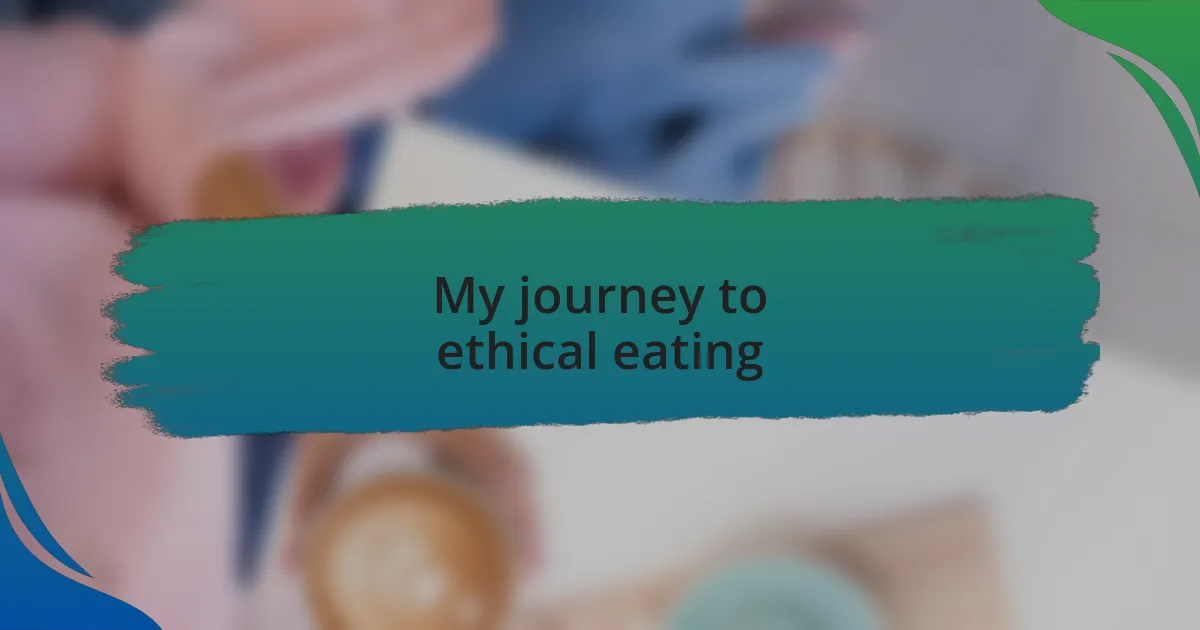
My journey to ethical eating
I still remember my realization during a casual grocery trip when I stumbled upon a section dedicated to local farmers. It was a turning point—I felt like I was giving a nod to people who put their heart and soul into their work. That moment made me question: how often do we think about the stories behind our food? Embracing ethical eating began for me as a way to support these local heroes.
As I delved deeper, I encountered the harsh realities of industrial farming practices—stories that left me unsettled yet motivated. This knowledge turned my meals into a canvas of choices, where I found pride in selecting ingredients that align with my values. I remember feeling a rush of joy when I learned that opting for regenerative agriculture not only benefited my health but also nurtured the earth. Isn’t it amazing how our food can be a bridge to a more sustainable future?
Transitioning to ethical eating wasn’t just a dietary shift; it was a profound journey of self-discovery. I recall moments spent in the kitchen, exploring vibrant recipes with ingredients I’d never dared to use before. Each dish became a reflection of my values, sparking conversations with friends and family. It made me wonder: how can something as simple as a meal open the door to discussions about ethics and sustainability? It truly transformed my experience from mere consumption to a meaningful engagement with the world around me.

Tips for ethical eating choices
When it comes to making ethical eating choices, I often find that planning my meals in advance is essential. Taking a few moments each week to decide what I’ll cook has transformed my shopping experience. It not only helps me avoid impulse buys but allows me to ensure I’m sourcing local and organic ingredients whenever possible. Have you noticed how much more mindful we become when we have a plan?
One tip that has resonated with me is to join a community-supported agriculture (CSA) program. By becoming a member, I feel a deeper connection to the land and the people who cultivate it. Each week, I eagerly await the seasonal produce, and there’s something profoundly rewarding about supporting farmers directly. How often do we get to experience food that’s just hours fresh from the farm?
Also, I’ve started to pay attention to labels and certifications, which has opened my eyes to the importance of ethical sourcing. The first time I picked up a product with a fair trade label, I realized the impact my choices could have beyond my plate. It’s incredible to think that each bite has the power to support fair wages and encourage sustainable practices. Have you ever thought about the real stories woven into the labels we often overlook?